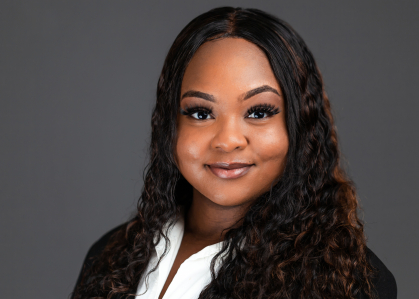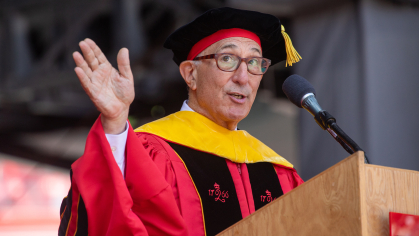Public Health Graduate Studies Marginalized Communities Like Her Own

Diamond Cunningham's background inspired her research into the ways in which bias and systemic racism affect mental and physical health
Diamond Cunningham knows her research subjects in a way few scientists ever will.
Unlike most of her fellow students researching marginalized populations at Rutgers School of Public Health, Cunningham, who completed her master’s degree, spent her life among the marginalized.
The daughter of Jamaican immigrants, she’s a young Black woman who grew up in what she calls “an extremely low-income” family. In fact, it was precisely her background that spurred her to pursue research into the ways in which bias and systemic racism affect mental and physical health.
As an undergraduate public health major at the University of South Florida, she realized that “the people we were talking about in class were the people I grew up with.”
Given her socioeconomic and ethnic background and her embrace of higher education, she understood she’d be in a special position: “I was a member of many of these populations and I could be in a place of privilege where I got to critique, evaluate, and help plan and implement programs to better the health outcomes of these groups that have absolutely no voice.”
Her advisor, Devin English, an assistant professor at Rutgers School of Public Health, calls her “one of the most empathic students with whom I’ve had the pleasure of working.” He also describes her as “one of the brightest and most driven.”

In spite of that drive, though, she often felt like an alien in academia. “In most of my classes,” she says, “there were few others who looked like me, and when there were, we usually had very different socioeconomic backgrounds.” She sometimes battled imposter syndrome: the feeling that, beneath the trappings of academic success, she was essentially undeserving.
Nevertheless, she persevered, impelled by a powerful desire to make a difference and a passion for learning. As a child, she says, “I always thought school was my only way out, so I’d better start loving it somehow.”
By the time she reached high school, it was clear that had already happened. This spring, thanks to her love of learning, she’ll receive her master’s degree in public health, with two manuscripts under review at peer-reviewed journals and a Meritorious Abstract Award from the 2021 Society of Behavioral Medicine Conference.
It’s been a productive two years. As a research assistant working with English, Cunningham has been deeply involved in his ongoing NIH-funded project examining the impact of discrimination on the biological and psychological health of young Black LGBTQ men, and she’s worked on the development of a mobile app designed to combat bias-based health inequities among that population.
Her work with English, she says, was what inspired her to focus her studies on social epidemiology, the science of how social institutions and relationships shape the health of entire populations.
The papers she’s coauthored reflect her fascination with the subject. With Pamela Valera, she wrote about the underuse of PrEP—pre-exposure prophylaxis, a medication designed to prevent HIV infection—by incarcerated men. She knew well the stigma associated with PrEP among the incarcerated, but she wanted to help determine the basis of that stigma in order to create an intervention that could lead to greater acceptance of the medication. The paper is now under review at the journal AIDS Care – Psychology, Health & Medicine – Vulnerable Children and Youth Studies.
With English, she coauthored a manuscript, submitted to the Journal of Adolescent Research, about young Black sexual-minority men and their experiences with suicidal behavior and thoughts. That, she says, “was a really significant manuscript to be involved in, and I’m really thankful for the opportunity.”
Her award-winning abstract, on which she was lead author, with Jonathan Rendina and Ali Telan as coauthors, analyzed how childhood sexual abuse and religious affiliation work in tandem to create a sense of shame among sexual-minority men. She never expected to win an award for the paper, which she’s editing, and had worried wouldn’t be accepted. She submitted it, she says, because it was a subject that demanded greater recognition.
In the fall, Cunningham will continue her research in a doctoral program at the Tulane University School of Health and Tropical Medicine. Her career goals include both researching and teaching, the latter deeply influenced by her experience at Rutgers.
“Every faculty member I’ve come in contact with has done at least 10 things to help me advance,” she says, including recommending outside training, sharing information and, most importantly, mentorship.
“If a professor had never told me, ‘Hey, your writing’s really good,’ I would never have submitted anything,” she says. “If a professor hadn’t told me about funding for Ph.D. programs, I would never have applied.” Given how much confidence and inspiration she’s gleaned from her mentors, she says it is her ultimate goal to be a similar resource for other nontraditional students like her.
She will likely have a significant impact on both her students and the populations she studies, says English. “I have no doubt that Diamond will be a leader in equitable public health research and practice for years to come,” he says.


